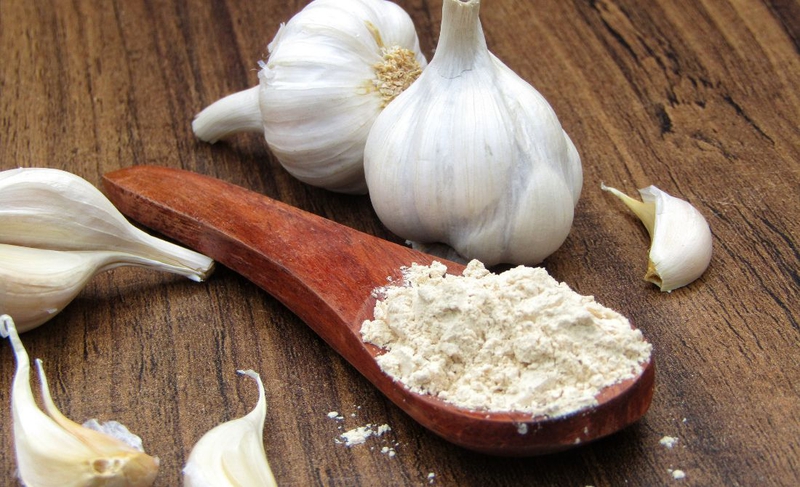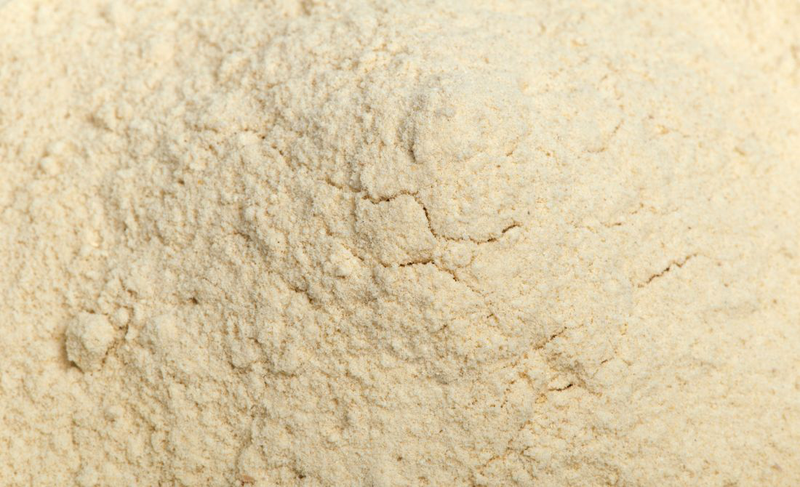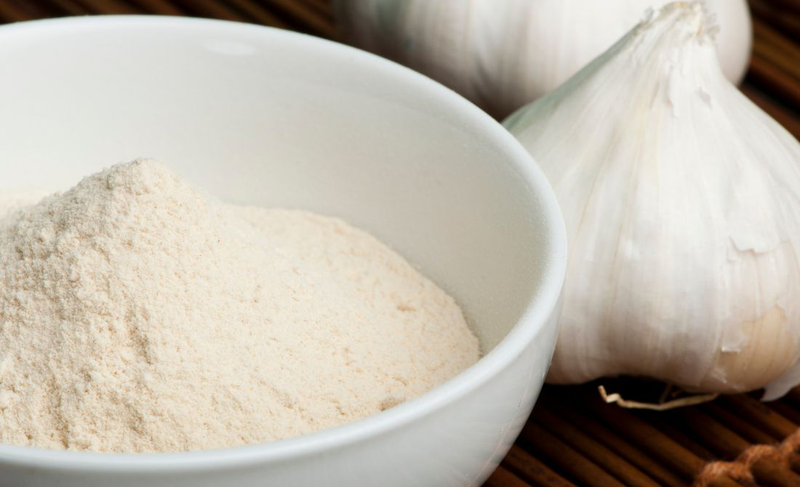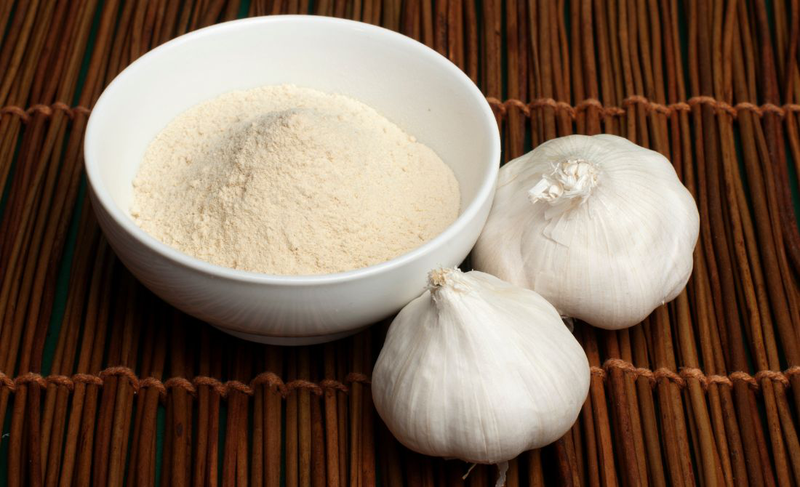Garlic powder, a familiar spice in cuisine, not only enhances the flavor of dishes but is also a powerful “assistant” for health. Below are the nutritional composition as well as the health benefits that garlic powder brings.
Since ancient times, garlic has not only been a spice but also considered a medicine in folk medicine. Nowadays, to bring convenience to users, manufacturers use the freshest garlic bulbs to produce natural garlic essence or garlic powder. Garlic powder is not only used in cuisine to enhance the flavor of dishes but also brings countless health benefits. Let’s explore.
Nutritional composition and beneficial compounds in garlic powder
Garlic powder is made from fresh garlic bulbs, through the process of cleaning, crushing and drying. Through this process, fresh garlic is transformed into a convenient powder form, easy to store and use. It is estimated that 100g of garlic powder provides approximately:
- Calories: 331;
- Total fat: 0.7 g;
- Saturated fat: 0.2 g;
- Sodium: 60 mg;
- Potassium: 1,193 mg;
- Total carbohydrates: 73 g;
- Fiber: 9 g;
- Sugar: 2.4 g;
- Protein: 17 g;
- Vitamin C: 2% of the recommended daily intake;
- Calcium: 7% of the recommended daily intake;
- Iron: 31% of the recommended daily intake;
- Vitamin B6: 85% of the recommended daily intake;
- Magnesium: 19% of the recommended daily intake.
The nutritional composition of garlic powder is quite diverse. But what makes garlic powder special is the sulfur compounds, especially allicin. In addition to allicin, garlic powder also contains many other sulfur compounds such as ajoene, diallyl disulfide. In addition, garlic powder also provides a significant amount of other essential minerals for the body such as manganese and selenium. With such nutritional content, garlic powder is not only a simple spice but also a natural “medicine” that helps improve health and prevent disease.

Garlic powder is made from pure fresh garlic
Health Benefits of Garlic Powder
Eating garlic has the same effect as using garlic powder. With a high content of bioactive compounds, garlic powder brings countless health benefits. Specifically:
Antibacterial and anti-inflammatory properties of garlic powder
Allicin, a sulfur compound characteristic of garlic, is considered the “soul” of this spice. Allicin has strong antibacterial and anti-inflammatory properties. It helps the body fight disease-causing bacteria, reduce inflammation and strengthen the immune system. Therefore, using garlic powder regularly is like creating a “shield” for the body against colds, coughs, sore throats and other infections.
Garlic powder is good for the heart
In addition, garlic powder is also very good for the heart. Studies have shown that regular consumption of garlic powder helps reduce bad cholesterol and increase good cholesterol. This helps prevent plaque buildup in the arteries and lower blood pressure. It can be said that garlic powder helps reduce the risk of cardiovascular diseases such as atherosclerosis, heart attack and stroke.
Garlic powder helps prevent cancer
There are many sulfur compounds in garlic powder such as: Allicin ajoene, S-allyl cysteine, diallyl disulfide and diallyl trisulfide. They also help neutralize free radicals – the cause of cell and DNA damage, thereby preventing the formation and development of cancer cells. Studies show that sulfur compounds can inhibit the proliferation and division of cancer cells, while stimulating the self-destruction of cancer cells.

Garlic powder deserves a place in everyone’s diet.
In addition, garlic can inhibit the formation of nitrosamine, a carcinogen that can be produced during the digestion of certain foods. Compounds in garlic can help enhance the ability to repair damaged DNA, helping to prevent gene mutations and the formation of cancer cells.
Garlic powder also significantly improves the digestive system
Thanks to its ability to kill intestinal bacteria, garlic powder helps reduce symptoms of indigestion, bloating, and constipation. At the same time, anti-inflammatory compounds in garlic also help soothe the intestinal mucosa, reducing inflammation and ulcers.
In addition to the above uses, vitamins and minerals in garlic powder such as vitamin C, manganese and selenium help increase resistance, protect cells and fight harmful free radicals.
The best way to use garlic powder for health
To maximize the benefits of garlic powder, using it properly is extremely important.
How to choose and use garlic powder
When buying garlic powder, you need to choose products with clear origins. Products from reputable brands often ensure higher quality and purity. Quality garlic powder is usually light yellow, has a characteristic garlic aroma and is free of impurities.

Garlic powder needs to be used properly and in the right dosage.
You can use garlic powder mixed with warm water to drink. To increase the effectiveness of garlic powder, you can combine it with foods rich in antioxidants such as honey, ginger, lemon. Using garlic powder as a seasoning or cooking is the most common way to use it.
The recommended daily dose of garlic powder is usually 1 – 2 g, equivalent to 1/4 to 1/2 teaspoon. However, the specific dose may vary depending on the health condition and purpose of use of each person. Overdose of garlic powder can cause some side effects such as heartburn, indigestion, bad breath.
Who should not use garlic powder
People with stomach pain, stomach ulcers should limit the use of garlic powder because it can irritate the stomach lining. Garlic powder can interact with some medications, so if you are taking medication, you need to consult your doctor to ensure safety. Garlic has the effect of lowering blood pressure. People with low blood pressure who eat a lot of garlic can cause their blood pressure to drop too low, causing dizziness, fatigue, and even fainting.
People who are allergic to garlic or sulfur compounds should absolutely not use garlic powder. Some studies show that garlic can put pressure on the liver, especially when eaten in excess. People with impaired liver function should limit their intake of garlic. Garlic has a blood-thinning effect. It can increase the risk of bleeding in people with bleeding disorders or who are taking anticoagulants such as warfarin. You should stop eating garlic at least 2 weeks before surgery because garlic can increase the risk of bleeding during and after surgery.

Some people are not suitable to use garlic powder.
Garlic powder, a familiar spice in the kitchen, not only enhances the flavor of dishes but is also a valuable natural “medicine”. With its wonderful health benefits, garlic powder deserves a special place in your diet. However, to achieve the best results, you should use garlic powder properly and combine it with a healthy diet and scientific lifestyle.





